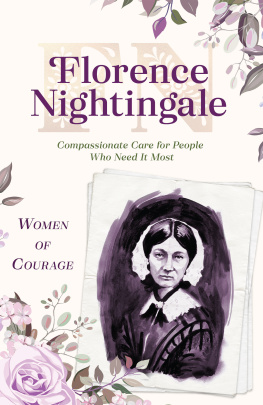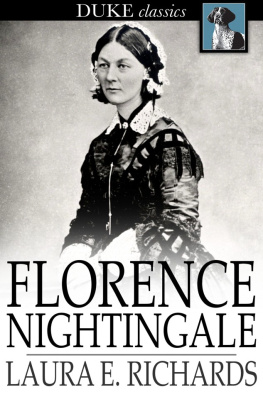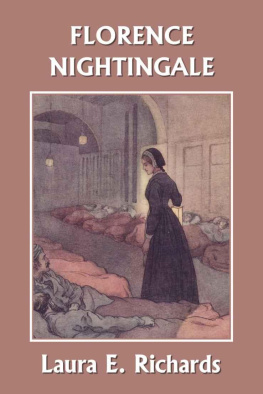Barakaldo Books 2020, all rights reserved. No part of this publication may be reproduced, stored in a retrieval system or transmitted by any means, electrical, mechanical or otherwise without the written permission of the copyright holder.
Publishers Note
Although in most cases we have retained the Authors original spelling and grammar to authentically reproduce the work of the Author and the original intent of such material, some additional notes and clarifications have been added for the modern readers benefit.
We have also made every effort to include all maps and illustrations of the original edition the limitations of formatting do not allow of including larger maps, we will upload as many of these maps as possible.
FLORENCE NIGHTINGALE
THE WOUNDED SOLDIERS FRIEND
BY
ELIZA F. POLLARD
The worlds a room of sickness, where each heart
Knows its own anguish and unrest;
The truest wisdom there and noblest art,
Is his who skills of comfort best;
Whom, by softest step and gentlest tone
Enfeebled spirits own,
And love to raise the languid eye,
When like an angels wing, they feel him fleeting by.
PREFACE.
Wearing the white flower of a blameless life
Before a thousand peering littlenesses.
IN these pages If have attempted to write the life of one who has recently departed from amongst us, and whose death brought the memory of her vividly back to those who knew and loved her for the work she wrought whilst living. To the younger generation she is a familiar nameto them, by her deeds she is known.
Comparatively few were admitted into the sacred precincts of her private life; only those who needed her help, who worked with or for her, or those who were linked to her by ties of blood and friendship, approached her.
Like all noble souls Florence Nightingale cared little for the praise of men, in the accomplishment of the work which she did for Christs sake.
I, a woman, am writing a womans life, and shall strive to bring before those who read this book the lesson she taught, that There is work to our hand, if we will but see it; work of the very highest order,the caring for that Temple, which is the Temple of the living God, the human body, which Christ took upon Himself, and thereby sanctified and honoured.
To write of one who was with us but a few years ago, whose living presence is, so to speak, still hovering over us, is no easy task, and yet the simple beauty of Florence Nightingales life minimises the difficulty in her casethere is such tender austerity in her character. Like our Saviours, her lifes work was begun and ended in the space of three years, but the work she accomplished is, like His, immortal. At her countrys call she left her beautiful home to succour and to helpas only she could dothe brave men who were dying for that countryhers and theirs! Her work done, she went home again. Since then her voice has been heard, her spirit has been felt, and will continue to be felt amongst us from generation to generation. She herself remained in the background, partly from ill health, but more especially because the work she had set herself to do lay in itself so near her heart, that any appearance of personal vanity, anything that might throw a slur upon it or call in question the purity of her motives, would have been pain and grief to her.
She had a lesson to teach, which she learnt first herself and then gave forth by precept and example to the world: the law of order and obedience, and the necessity of systematic training, by which alone knowledge and power can be acquired for the overcoming of vice and the bringing of help and relief to suffering humanity.
Christ went up to Jerusalem, and was found by His mother in the Temple in the midst of the Rabbis, both hearing and asking them questions. Afterwards He went back with her to Nazareth, and bided His time; but from that hour He was about His Fathers business. Even when in the workshop with Joseph He was in training, preparing for those three short years of ministry which were to change the moral face of the whole earth.
This is the great lesson Florence Nightingale brought into evidence, that nursing the sick, and tending the poor, must be done systematically, with order; not as desultory work to be taken up and dropped as the whim of the moment may dictate, but as a high and noble calling, worthy to be undertaken by the greatest lady in the land, even as by the humblest member of Christs flock, if their hearts be in the work. Not for themselves must they labour, but for God; that is the keynote of her teaching and of her work. Self must be put away; not by acts of asceticism and mortification, but by the power of loveof Divine love.
For those who enter upon it in this spirit, we will quote her own words:I give a quarter of a centurys European experience, when I say the happiest people, the fondest of their occupation, the most thankful for their lives, are, in my opinion, those engaged in sick nursing. It is a mere abuse of words to represent the life, as is done by some, as a sacrifice and martyrdom.
In the natural course of events, there have been martyrs, in this as in every other great movementthe founders and pioneers of everything that is best and noblest, must be content to be martyrs. But they rarely think of themselves as such. There must be constant self-sacrifice in all things for the good of others. But a nurses life, if rightly viewed, is not a life of sacrifice; it is engaging in an occupation the happiest of any. The strong, the healthy wills in any life, must determine to pursue the common good at any personal cost, at daily sacrifice; and we must not think that any fit of enthusiasm will carry us through such a life as this.
Nothing but the feeling that it is Gods work more than ours, that we are seeking His success not our success, and that we have trained and fitted ourselves by every means which He has granted us to carry out His work, will enable us to go on.
Florence Nightingales whole teaching is, from first to last, summed up in these words, Love of God and forgetfulness of self.
ELIZA F. POLLARD.
CHAPTER I.EARLY DAYS.
Little efforts work great actions;
Lessons in our childhood taught
Mould the spirit of that temper
Wherein mighty deeds are wrought.
Cherish then the gifts of childhood,
Use them gently, guard them well;
For their future growth and greatness
Who can measure, who can tell?
Mrs. Alexander.
LOOK at old Roger, what can have happened, I his sheep are scattered all over the hillside, and he is calling after them, but they dont seem to listen much?
The speaker, a little girl of about ten years old, mounted on a shaggy pony, pointed with her whip to where a flock of sheep was running hither and thither regardless of the voice of an old shepherd, who, with his sheep-skin over his shoulders and his tall crook in his hand, was vainly striving to keep them together.
Yes, he does seem in trouble, said the childs companion, an elderly gentleman, evidently a clergyman.
Shall we ride across and ask him what is the matter?












